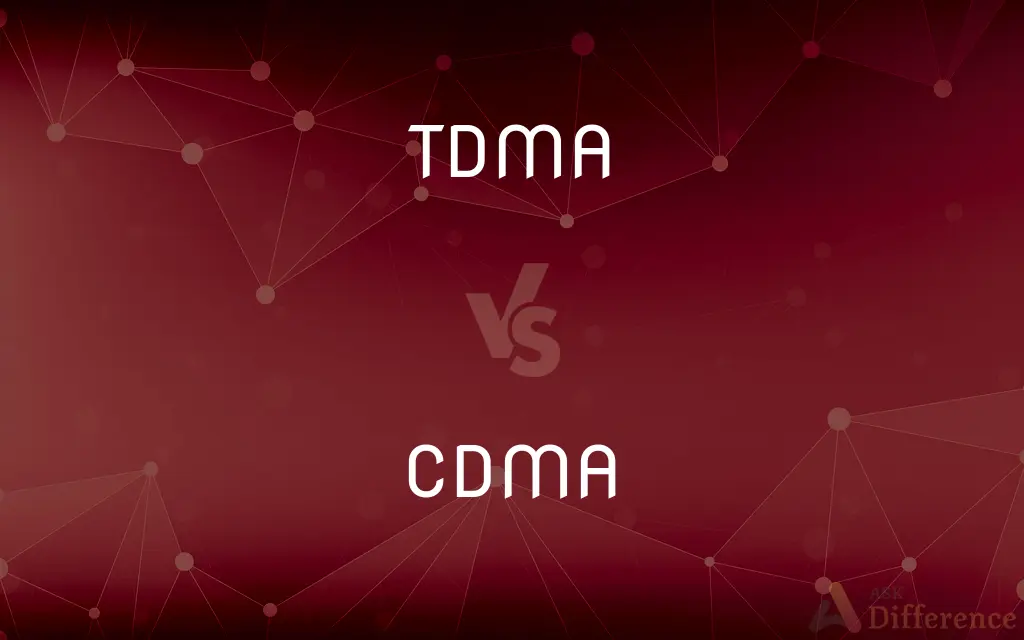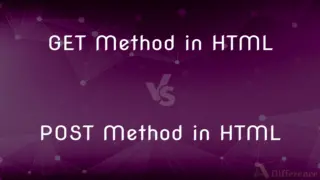TDMA vs. CDMA — What's the Difference?
By Tayyaba Rehman — Published on January 11, 2024
TDMA (Time Division Multiple Access) allocates specific time slots for each user in a channel, while CDMA (Code Division Multiple Access) allows multiple users to share the same frequency band simultaneously.

Difference Between TDMA and CDMA
Table of Contents
ADVERTISEMENT
Key Differences
TDMA (Time Division Multiple Access) is a technology that divides a radio frequency into time slots and assigns each slot to a different user. This method allows multiple users to share the same frequency without interference. In contrast, CDMA (Code Division Multiple Access) allows multiple users to occupy the same time and frequency allocations simultaneously. Each CDMA user is assigned a unique code to differentiate their communications.
TDMA effectively manages the spectrum by allocating time slots, making it efficient for voice communication where the signal is continuous and uniform. However, CDMA uses a spread-spectrum technique where each user's signal is spread over a wide band of frequencies. This makes CDMA more suitable for data transmission and high-bandwidth applications.
In TDMA systems, the call quality can degrade if there are more users than time slots available, leading to dropped calls or delays. On the other hand, CDMA systems can handle more users but may experience a decline in quality when the number of users increases significantly, due to interference.
TDMA is simpler to implement and requires less processing power than CDMA. It's also more battery-efficient for the device. Conversely, CDMA requires more complex signal processing, which can consume more power but provides better coverage and capacity in certain situations.
TDMA is commonly used in 2G networks (GSM), while CDMA has been widely adopted in 3G networks and beyond. CDMA's ability to handle greater user capacity and provide better security makes it a preferred choice for modern cellular networks.
ADVERTISEMENT
Comparison Chart
Access Method
Allocates specific time slots to each user
Allows multiple users to share the same frequency band
Suitability
More efficient for voice communication
Better for data transmission and high-bandwidth usage
User Capacity
Limited by the number of time slots
Higher capacity, limited by interference
Technical Complexity
Less complex, more battery-efficient
More complex, requires advanced signal processing
Usage in Cellular Networks
Common in 2G networks (GSM)
Widely used in 3G networks and beyond
Compare with Definitions
TDMA
TDMA is simpler and more battery-efficient for devices.
My phone's battery lasts longer thanks to the TDMA system.
CDMA
Each CDMA user has a unique code for communication.
The unique codes in CDMA prevent user signal interference.
TDMA
It's a method to share a single radio frequency without interference.
TDMA technology prevents calls from interfering with each other.
CDMA
Common in 3G and newer cellular networks.
CDMA technology is a key component in our 3G network.
TDMA
Used primarily in 2G cellular networks.
TDMA is the backbone of our GSM network.
CDMA
CDMA allows multiple users to share the same frequency band.
CDMA's shared frequency approach maximizes our network capacity.
TDMA
TDMA assigns time slots in a sequence to multiple users.
Our 2G GSM network uses TDMA for efficient voice transmission.
CDMA
It uses a spread-spectrum technique for data transmission.
CDMA spreads signals across a wide frequency range.
TDMA
Time slots are allocated to users in a cyclic order in TDMA.
Each user in TDMA gets a dedicated time slot for communication.
CDMA
CDMA provides better coverage and capacity.
Our CDMA network handles high data traffic efficiently.
Common Curiosities
What is the key feature of CDMA?
CDMA's key feature is its use of unique codes for each user over the same frequency.
What is CDMA?
CDMA is a communication method where multiple users occupy the same frequency band simultaneously.
How does TDMA manage multiple users?
TDMA assigns each user a specific time slot for communication.
What is TDMA?
TDMA is a technology that divides a communication channel into time slots for different users.
Can TDMA handle data transmission effectively?
TDMA is less efficient for data compared to voice transmission.
Is TDMA still used today?
Yes, it's used in 2G GSM networks, but less so in newer technologies.
Which consumes more battery: TDMA or CDMA?
TDMA typically consumes less battery than CDMA.
What's the main disadvantage of TDMA?
Its main disadvantage is the limited capacity due to a fixed number of time slots.
Do CDMA networks suffer from interference?
Yes, CDMA networks can experience quality issues with high user density.
Does CDMA provide better security than TDMA?
Yes, the unique coding in CDMA offers enhanced security features.
Are CDMA networks more efficient than TDMA?
CDMA is generally more efficient in handling high-bandwidth applications and more users.
Which technology is better for rural areas?
CDMA tends to provide better coverage in rural areas.
Is CDMA more complex than TDMA?
Yes, CDMA requires more complex signal processing.
Which technology is more prevalent in modern mobile networks?
CDMA and its derivatives are more common in modern 3G and 4G networks.
Can TDMA and CDMA coexist in the same network?
They are generally used in separate network types due to differing technologies.
Share Your Discovery

Previous Comparison
Polymorphism vs. Amorphism
Next Comparison
GET Method in HTML vs. POST Method in HTMLAuthor Spotlight
Written by
Tayyaba RehmanTayyaba Rehman is a distinguished writer, currently serving as a primary contributor to askdifference.com. As a researcher in semantics and etymology, Tayyaba's passion for the complexity of languages and their distinctions has found a perfect home on the platform. Tayyaba delves into the intricacies of language, distinguishing between commonly confused words and phrases, thereby providing clarity for readers worldwide.













































